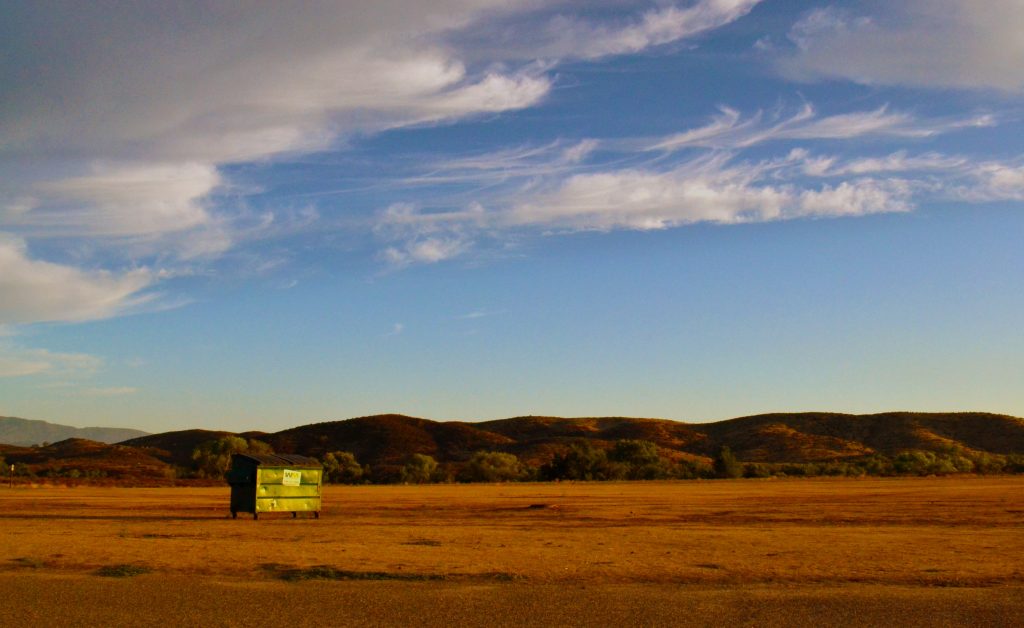What If We All “Left No Trace?”

There’s one thing that keeps showing up over and over in my outdoor experiences: trash.
Most recently, I saw littered beaches (both from people not picking up after themselves and from trash washing up in the waves) along the Pacific Coast during a bicycle tour. A couple months ago, I was crawling through mud caves in Anza Borrego, when I looked down and found 2 Starburst wrappers illuminated by my headlight. Before that, I was hiking a mountain in the Joshua Tree back-country and happened upon a deflated helium balloon. Then – later that night – I sat my tent down and fell asleep, just to wake up in the morning and find myself trying to maneuver out of my tent on shards of glass and plastic.
I thought to myself: why is this happening?
Why am I finding trash in areas that are off the beaten path? In fact, these areas are so remote that the Joshua Tree trail log I found indicated I was the first human to step foot on that mountain in a month!
As outdoor enthusiasts, most of us know (or at least have heard of) the 7 Principles of Leave No Trace. These are guiding principles that all nature lovers and trail explorers are expected to adhere to – an ethical code that ensures everyone has the best time possible and no one gets hurt (including the environment).
They include:
- Plan ahead and prepare
- Travel and camp on durable surfaces
- Dispose of waste properly
- Leave what you find
- Minimize campfire impacts
- Respect wildlife
- Be considerate of other visitors
Yet, with these in place, it still seems we are falling short – on the trails and right at home. Especially when it comes to point number 3: ‘dispose of waste properly.’
It’s a simple idea that, if you bring it in, you should bring it out. Because even throwing garbage in a trash can will attract wild animals – putting them, you and your fellow campers in danger.
Yes, the fact that you have to lug out all of your trash after a long weekend tends to change the way you pack. Yes, it does require a little extra work and thought. I put my food in re-useable, collapsible containers that are lightweight, look for foods that are packaged in bulk (as opposed to individually), ditch boxes and carry my water in a reusable bottle. I then carry one zip-lock bag that serves as my trash can for the hike.
It’s not a perfect process, but it’s just an example of how one might look to minimize the waste they will produce over a duration of several days.
After thinking about all of this over the weekend, I got back into town and realized that the very same trash that got me so frustrated while hiking was everywhere around me: plastic water bottles along the road, cigarette butts on the sidewalk, soda cans on the beach…
And then I realized just how much I throw away in a typical day.
It’s a lot. No wonder trash is popping in places like a back-country mountainside, or a remote island in the middle of the Pacific Ocean.
Here’s a thought:
What if – like when camping or hiking – we were expected to pack out what we pack in during our daily lives? What if we had to carry around a backpack and keep our trash in there until the end of the day? Or the end of the week?
Would all your trash fit? I know mine wouldn’t most days.
More importantly, would it change our behavior? Would it shift our focus from consuming to minimizing, from thinking everything can be disposed of to finding items that can be reused again and again?
I know you’ve probably been told to recycle more or use fewer plastic bags. So, I won’t repeat what you’ve already heard. But I do hope you become more aware of the choices you make throughout the day. Ask yourself if what you are doing is sustainable – and for how long.
In some places, this is easier to do than others because of green initiatives from cities and states. Take for example, San Francisco, when they banned the sale of plastic water bottles on city-owned property. Or the entire state of California voting to pass a law banning the use of single-use plastic bags. Even in areas that don’t actively promote green living, you can still do something on an individual level.
First, become aware of the trash you are creating.
Buy a smaller trash can and be mindful about how often it fills up. Separate recyclables and trash. Compost when possible. Then, take it into your purchases – are there things you can buy that have reusable or recyclable containers? Can you buy in bulk? For me, it’s powerful to think about where things will end up after I’m done with them. I do this before I even make the purchase.
I’d be curious to know what your opinions are. Do you agree, or do you think everyone should just mind their own business and live the life they want? Share your thoughts. Let me know what you are or aren’t doing in the way of sustainability when on the trails.
As humans, we don’t particularly like the idea of ‘leaving no trace.’ At our core, we want to leave some sort of legacy behind for generations to come. I know I certainly do.
It may be a lofty goal, but I’d love to leave the world a better place than I found it. I’d like to know that I sparked interesting conversations and got people thinking. That I was the source of someone’s laughter and a positive memory in their own life stories. That my thoughts and experiences helped inspire someone else’s actions in a big way.
I’m not sure exactly how this will come about or what my legacy will be. But I do know I don’t want it to be a pile of garbage.
